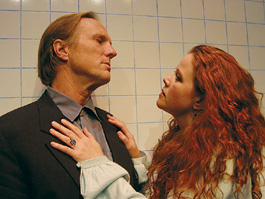home | metro silicon valley index | the arts | stage | review

Blackmail: Kurt Gravenhorst's Krogstad puts the pinch on Shannon Stowe's Nora.
Oh, What A Doll
Ibsen's 'Doll House' moves to the '50s for Pear Avenue production
By Marianne Messina
THE PEAR AVENUE THEATRE production of A Doll's House takes Henrik Ibsen's constrictive society and makes it smooth and palatable. Set in the 1950s with silver Christmas tree, cozy fireplace and well-stocked bar instead of Ibsen's Victorian drawing room, this production's 19th-century couple turned Stepfords do surprising, often refreshing things with Ibsen's words. Mark Messersmith's Torvald Helmer is bubbly and affable, not the stodgy, starchy, officious husband who treats his wife as an inconsequential pet. Dressed by costume designer Mary Cravens in loose pants and sweaters rather than crisp, pressed suits, he seems an approachable Torvald who hardly embodies the remark "Torvald is a very refined man."
As his wife, Nora, to whom he refers in countless diminutives—song bird, little creature, "this little thing," Shannon Stowe, with her childlike voice, youthful coquettish ways and flowing red hair ending with bouncy curls, makes Torvald's pet names understandable. A '50s housewife, this Nora may be pampered and unaware, but she's not ditzy. And she doesn't seem a secretly independent woman coerced to wear the mask of dependence (as Nora herself reads it). She's just quite unaware that she's not independent. There is no want of sexual playfulness in this marriage as Stowe's Nora hugs, kisses and runs her fingers over Torvald. The relationship seems to have grown into one of mutually cutesy-pie interactions.
Messersmith's Torvald is not simply treating Nora like a child, he's using her to gain access to a space where he can act childish himself. In this way, the relationship seems fairly warm, however illusory—and the harder to break out of. Though she lays it on especially thick for Torvald, Nora maintains her childish charm no matter whom she's with, including the extortionist Nils Krogstad (Kurt Gravenhorst). In borrowing money from Krogstad (a Victorian woman didn't do such things on her own), Nora has also forged her father's signature on the promissory note. But the '50s Krogstad finds he must first explain everything Nora's guilty of before he can use the "evidence" to blackmail her.
Again this production goes deftly to the gray area. Nora's naiveté is not a ruse in a cat-and-mouse game with Krogstad, nor does Stowe play Nora as ignorant, but as logical, thus implying that the way things are makes no sense. At more than one juncture, Krogstad finds himself befuddled. Cravens hits right on the mark with Stowe's costuming, dressing her in flush cardinal red (well, it's Christmastime) that presents as bright, cheery and youthfully classy. Nora provides quite a contrast to her friend Christine Linde (Kristene Withekaye), who has had to work for a living all her life. In dun-colored clothes and limp hair, Withekaye's subdued, reticent Kristine seems at first terribly shy or guarded, but later seems more gentle and focused. By the time she makes her clearheaded proposition to Krogstad, Linde has emerged as Nora's complement not only in appearance but also in an approach to life and its choices.
Since the '60s, A Doll's House has often been treated as a play about the objectification of women, but the Pear's version, directed by Jeanie Forte, steps back from that tack. In the climactic moment, it allows us to be almost as shocked as Nora at Torvold's heated words, and again to share Torvald's shock at Nora's reaction. Broader than the feminist question, this production throws light on our tolerance, in relationships, for illusion.
A Doll's House, a Pear Avenue Theatre production, plays Thursday-Saturday at 8pm and Sunday at 2pm through Feb. 4 at the Pear, 1220 Pear Ave., Unit K, Mountain View. Tickets $10-$24. (650.254.1148)
Send a letter to the editor about this story.
|
|
|
|
|
|